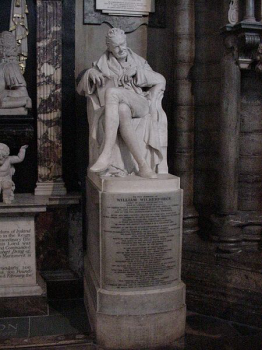Cardinal reaffirms Church commitment to combating modern slavery

Wiki image: Statue of William Wilberforce, Westminster Abbey by Richard F Muth
In an address given at a service to commemorate the work of William Wilberforce and to inaugurate the office of the Independent Anti-slavery Commissioner at Westminster Abbey on 12 October, Cardinal Vincent Nichols reaffirmed the Church's commitment to combating modern slavery.
Comparing the current situation with the one facing Wilberforce, the politician who campaigned to abolish the slave trade in the 18th century, the Cardinal explained that then, as now, it "disfigures our society and calls for an unremitting effort to bring it to an end."
"Human trafficking and modern day slavery are perpetrated by large, criminal international networks," he said and emphasised that the Catholic Church is "slowly mobilising its considerable, international networks, contacts and resources' in an effort to eradicate this trade."
The Cardinal paid tribute to the work of religious sisters, working in the Talitha Kum network, who "put their lives at risk every day to get close to the victims of human trafficking in the most dangerous of circumstances."
He expressed his confidence that the Government would work with the Government of France, to tackle child exploitation in the Calais camps and 'very urgently improve the effectiveness of the asylum-seeking procedures, especially for children there, who may well have a right to be here and are certainly at terrible risk in the coming weeks."
Speaking of the Santa Marta Group, the international effort of the Catholic Church working with law enforcement agencies and the Church of England World Wide, he said that the progress it has made has been "effective and measurable" and said that when it presents its progress reports to Pope Francis in two weeks times, he felt confident that the Holy Father would be "greatly encouraged."
Also speaking at the service and reaffirming their commitment to combating human trafficking and modern slavery were Archbishop of Canterbury Justin Welby, Prime Minister Theresa May and Independent Anti-slavery Commissioner Kevin Hyland.
The full text of Cardinal Vincent's Westminster Abbey address follows:
Human trafficking and modern slavery are 'grievous wounds in the flesh of humanity'.
These words were spoken by Pope Francis in April 2014 at a meeting in Rome bringing together representatives of law enforcement agencies from around
the world and leaders of the Catholic Church from those same countries.
Pope Francis went on to add: 'They are a grievous wound in the flesh of Christ himself.'
This second, Christian, sentiment would have been profoundly shared by William Wilberforce whose work we honour this evening. He too drew all his motivation for the fight against slavery from his Christian faith. Yet in his day, as I read, religious enthusiasm was generally regarded as a social transgression and was stigmatised in polite society! But that did not put off this great reformer.
The words of Pope Francis marked the launch of the Santa Marta Group, an international effort of police forces and the Catholic Church world-wide, working together with the Church of England and other religious and civic groups, to tackle this most ancient yet modern of criminal activities. In this the Office of the Anti-Slavery Commissioner plays a crucial part. In the eighteenth century human slavery was a hugely profitable 'trade'. It is so today. Then, as now, it disfigures our society and calls for an unremitting effort to bring it to an end.
Human trafficking and modern day slavery are perpetrated by large, criminal international networks. Slowly the Catholic Church, among others, is mobilising its considerable, international networks, contacts and resources in this struggle. Direct and immediate cooperation with the forces of law and order is key, for it combines the rigour and power of the law with the compassion and selflessness of Christian dedication. For example, hundreds of religious sisters, working through their network, Talitha Kum, put their lives at risk every day to get close to the victims of human trafficking in the most dangerous of circumstances. Talitha kum means 'get up little girl'. It is the command of Jesus which brought new life to the dead. And those caught in slavery are often the living dead.
Today there are many situations where little children are at risk of being ruthlessly exploited by traffickers. This is so in every refugee camp, but most closely in Calais. I hope our Government, known rightly for its leadership in opposing human trafficking, and the Government of France, will very urgently improve the effectiveness of the asylum-seeking procedures, especially for children there, who may well have a right to be here and are certainly at terrible risk in the coming weeks.
In two weeks' time, the Santa Marta Group will present its progress reports to Pope Francis. He, I am sure, will be encouraged. Progress is measurable and effective. He will bless our efforts and assure us of his prayers. We are only just beginning. There is so much to be done. May the prayers of this congregation also strengthen this work, to which this evening we commit ourselves anew.
Source: Archbishops House


















